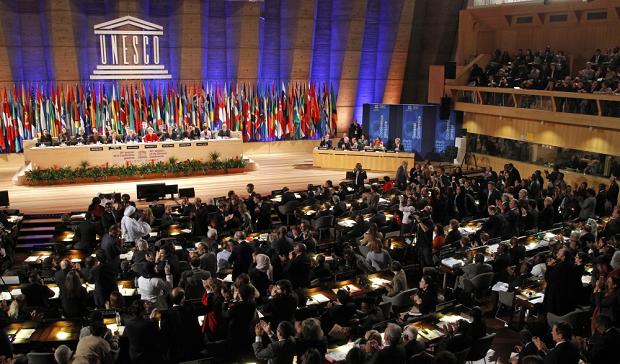US vs UNESCO: A crack in the wall North African Dispatches
New in Ceasefire, North African Dispatches - Posted on Thursday, November 3, 2011 12:00 - 1 Comment
By Kateb Salim
 This might well be the umpteenth article or comment piece you’ve read on the Palestinians’ successful bid for ‘statehood’ status at UNESCO. This week, the cultural star in the United Nations institutional constellation accepted Palestine as a full-fledged member state. Thus far recognised solely as an observer, the acceptance by a majority of the organisation’s 173 member states represents an outstanding diplomatic victory for Mahmoud Abbas and his team.
This might well be the umpteenth article or comment piece you’ve read on the Palestinians’ successful bid for ‘statehood’ status at UNESCO. This week, the cultural star in the United Nations institutional constellation accepted Palestine as a full-fledged member state. Thus far recognised solely as an observer, the acceptance by a majority of the organisation’s 173 member states represents an outstanding diplomatic victory for Mahmoud Abbas and his team.
The Palestinian leadership had launched this bid amongst particularly tense backroom talks with the United States and certain European states, openly hostile to the PLO’s efforts, who have exerted immense pressure on the Palestinian authority to withdraw its candidacy both at the United Nations General Assembly and any other body for that matter.
Underlying the UNESCO membership bid is a powerful moral message sent to nay-sayers that Palestine’s statehood claims exist and continue to draw support throughout the international community.
Israel’s message throughout the bid consisted of a carefully-crafted media strategy, often poisoning the well to set the debate on its own terms. While the state of Israel and its spokespersons attempted to discredit the PA in its very essence, Israel’s allies such as the United States denounced the ‘unilateral’ move made by the Palestinians to be recognised without prior negotiations. Every possible move in the diplomatic ‘playbook’ was used by American diplomats as they rushed to prevent the PLO from achieving its objectives.
Seeing the cracks in the titanic dam of silence they had built around the conflict, the United States administration went so far as to withdraw its financial contribution to UNESCO, citing legislation from the early 1990s as its official justification. The contribution represents over 60 million dollars in the 650 million dollar annual budget (a whopping 22%!) of an organisation aimed at bolstering education and cultural cooperation.
The UNESCO vote was a free and fair democratic vote where one state’s voice equated to any other’s. Unlike its sister UN body, the Security Council, UNESCO is not the geopolitical heirloom of WWII victors, where five permanent member states are able to veto and indeed discard any inconvenient resolution sent their way. When it found itself unable to have the proposition withdrawn within UNESCO and incapable of rallying other states to its agenda, the American administration had no other choice but to cater to its staunch pro-Israeli lobby in Congress and take punitive measures against…education and culture.
American and Israeli claims that the Palestinians’ bid to UN membership is a unilateral move which threaten peace negotiations are laughable for anyone who pays any attention to the daily news coming out of the region.
It would have been fair to hear similar outrage coming from the State Department, Congress or even the White House when Israeli settlers continued to illegally build hundreds of new colonies in occupied Palestinian territory.
One could argue that nothing is more unilateral (to use state department vocabulary) than Benjamin Netanyahu’s post-vote decision to push ahead with the construction of 2000 “housing units” in occupied East Jerusalem. The building of a modern-day Berlin wall around the occupied Palestinian territories, condemned by the international court of justice in the Hague as illegal, is also a unilateral move which destabilises negotiations. Again, silence from most Western capitals.
Like it or not, the United states and most European states lose immense credibility when they pass under silence such outright disregard for international law by the Israelis but are happy to point fingers at the smallest mistake the hapless Palestinians make.
The events of the past week certainly put things into perspective for those readers who’d ever doubted or continue to ignore the strong ties between Washington to Tel-Aviv. Although in my opinion the United States never really did meet the type of impartiality (in the region at least) needed to lead the way in talks between parties, the financial sanctions now placed on UNESCO have surely torpedoed any vestiges of “credibility” it might have retained for some as an honest broker in this conflict.
Though this vote represents little more than a symbolic and moral victory for the Palestinians, it goes a long way in revealing some of the injustices they face in trying to achieve dignity and freedom in their homeland.


Absolutely agree. One quibble, though: when referring to Israel, ‘poisoning the well’ is an unfortunate metaphor, it might be better to use something else.